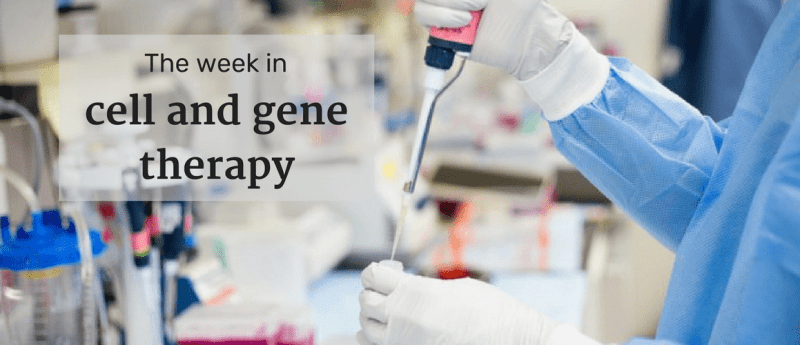Cell therapy weekly: Phase I clinical trial for corona-related respiratory distress proposed

Also this week: Phase III clinical trial for epidermolysis bullosa treats its first patient and new partnership forms to further gene circuit cell therapy.
The news highlights:
Phase I clinical trial for corona-related respiratory distress proposed
Phase III clinical trial for epidermolysis bullosa treats its first patient
New partnership forms to further gene circuit cell therapy
Phase I clinical trial for corona-related respiratory distress proposed
Cellenkos (TX, USA) has announced that they will seek to start a Phase I/II clinical trial to treat the acute respiratory distress syndrome that can develop as a result of COVID-19. The respiratory distress that develops following the infection can have fatal implications and is reported to be a major source of death. By repurposing the anti-inflammatory drug, CK0802, derived from umbilical cord regulatory T-cells, Cellenkos hope to reduce the severity of the condition.
“I think there is good reason to believe that an uncontrolled cytokine storm may be responsible for the acuity of the respiratory distress in some of the patients infected with COVID-19. Their body’s mechanism of controlling the dysregulated inflammatory process caused by COVID-19 becomes overwhelmed partially due to the dysfunction of their regulatory T-cells (T-reg cells), responsible for halting the inflammation. Therefore, adoptive therapy with healthy, T-reg cells that carry the homing signals for the lungs may be particularly effective since these cells are focused on resolving inflammation in the lung tissue and do not spill into other areas of the body,” explained Siddhartha Mukherjee, Scientific Advisor for Cellenkos.
“Rather than indiscriminate therapy with an anti-immune drug, such as an inhibitor of a cytokine, like IL-6, the T-reg cells can potentially and specifically calm inflammation exactly where it is most active — without causing a more general ‘global’ immunosuppression which would be harmful for a virally infected patient. This is a hypothesis that needs to be tested and I look forward to these urgently needed studies,” Mukherjee concluded.
Phase III clinical trial for epidermolysis bullosa treats its first patient
Abeona Therapeutics (TX, USA) has enrolled its first patient into a Phase III clinical trial, VIITAL, for recessive dystrophic epidermolysis bullosa (RDEB). RDEB is caused by a lack of COL7A1 in patients and can lead to severe skin wounds and pain. Abeona’s combination gene—cell therapy, dubbed EB-101, seeks to treat RDEB in up to 15 patients with 30 chronic wound sites, seeking to heal the lesions. EB101 is an autologous therapy that involves the introduction of COL7A1 into the patient’s own skin progenitors before the cells are transplanted to the wound site.
“Treating the first patient in our pivotal Phase III VIITAL study is an important achievement for the EB-101 program, now the most advanced gene therapy program in RDEB,” commented João Siffert, the Chief Executive Officer of Abeona Therapeutics.
“This achievement confirms that Abeona can deliver EB-101 in a study setting that closely parallels its potential real-world application. We remain confident that VIITAL will replicate results from the Phase I/II trial demonstrating that EB-101 treatment resulted in sustained and durable wound healing with a favorable safety profile,” Siffert continued.
New partnership forms to further gene circuit cell therapy
RoosterBio (MD, USA) has announced that they are entering into collaboration within Senti Bioscience (CA, USA) in an effort to drive forward gene circuit cell therapy. Providing their expertise in handling human mesenchymal stem cell (hMSCs) under GMP conditions, as well as their rapid product and process development platforms, RoosterBio will enable the scaling up and manufacturing of Senti Bioscience’s gene circuit technology in hMSCs. It is hoped that this new wave of products will enable the treatment of difficult to treat cancers such as ovarian cancer.
“Gene-modified cell therapies are one of the most important segments in our industry and we are excited to help Senti Biosciences accelerate its technology into the clinic,” stated Jon Rowley, Founder of RoosterBio.
“Our collaboration reflects the importance of strategically positioned gene engineering platforms that are designed for rapid clinical translation. RoosterBio’s goal of radically simplifying hMSC product development, process development and clinical manufacturing are being leveraged to move the field of cell therapy forward,” Rowley added.
For more weekly cell therapy news, read previous editions of the cell therapy weekly.
Have any additional questions about this story? Ask us in the comments, below.
Find out more in these top picks from the Editor:
- Fibroblast cell therapy treatment against coronavirus patented
- Curing the butterfly children: an interview with Michele De LucaCuring the butterfly children: an interview with Michele De Luca
- Mesenchymal stem cell differentiation influenced by molecular motors